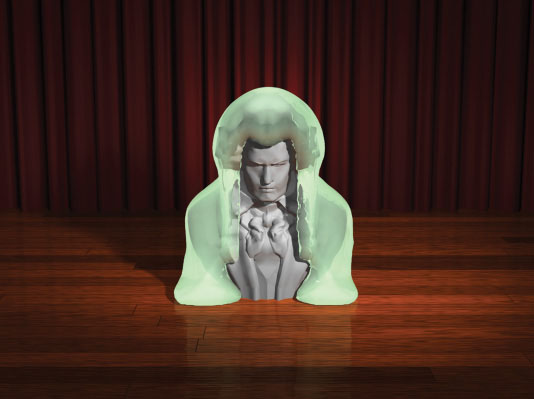“Gratuitous Goop” by O’Brien
Conference:
- SIGGRAPH 2004 More animation videos from SIGGRAPH 2004:


SIGGRAPH Video Review:
Track:
- 10
Title:
- Gratuitous Goop
Length:
- 0:48
Director(s):
Company / Institution / Agency:
- University of California, Berkeley
Description:
This video demonstrates a technique for animating the behavior of viscoelastic fluids, such as mucus, liquid soap, toothpaste, clay, or strange green goop, that exhibit a combination of both fluid and solid characteristics. The technique builds on prior Eulerian methods for animating incompressible fluids with free surfaces by including additional elastic terms in the basic Navier-Stokes equations. The elastic terms are computed by integrating and advecting strain rate throughout the fluid. Transition from elastic resistance to viscous flow is controlled by von Mises’ yield condition, and subsequent behavior is then governed by a quasi-linear plasticity model.
Hardware:
HARDWARE: Simulation and modeling on P4 2.8 GHz CPU, 4 GB RAM. Rendering on 600 MHz Itanium cluster, 2 GB RAM per node. Rendering farm: 306 CPUs.
Software:
SOFTWARE DEVELOPER: Modeling, animation, and dynamics: proprietary. Rendering: Pixie 1.3.4 (sourceforge.net/projects/pixie/). Additional software: Adobe Premiere 6.5. Custom software: We implemented our own code for simulation and modeling the goop. OS: Windows XP, Mandrake, and Redhat Linux.
Additional Contributors:
Producer: James F, O’Brien
Contributors: Okan Arikan, Adam Bargteil, Tolga Goktekin, James O’Brien, Chen Shen
Additional Information:
PRODUCTION
Modeling: Implicit surfaces defined with the particle levelset method. Rendering technique used most: Ray-marching using the open- source renderer, Pixie. Average CPU time for rendering per frame: 15-30 minutes. Total production time: approximately two months. Production highlight: This piece showcases a new simulation method for modeling visco-elastic fluids (a.k.a. goop). The method is described in a SIGGRAPH 2004 paper: A Method for Animating Viscoelastic Fluids by Goktekin, Bargteil, and O’Brien. Production work was done by two students.




